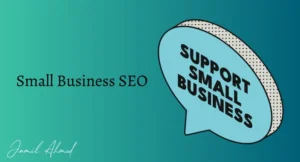What is SEO (Search Engine Optimization)?


My step-by-step guide covers everything from defining your brand to creating a website, SEO and using social media to your advantage. Start building a strong personal brand today!
What is SEO?
What is SEO? The answer lies in three letters: S.E.O. or Search Engine Optimization. SEO is my secret weapon in the online world.
This is a strategic method to increase the visibility of my website in search engine results. It helps me to connect with more people, drive more traffic, and achieve my goals. These goals could be selling a product, sharing information, or something else.
SEO is about understanding how search engines rank websites. It involves optimizing a website to get a good ranking.
Sounds straightforward, right? Well, it’s a tad more intricate, but don’t fret. I’m here to demystify SEO for you.
By grasping and applying effective SEO strategies, I can enhance my online presence and reach my target audience more efficiently. Now, who wouldn’t want that?
So, buckle up and move forward!
What is Search Engine Optimization (SEO)?
Understanding SEO
So, you’ve heard the term SEO, but what exactly does it mean? SEO, or Search Engine Optimization, is the art and science of making your website attractive to search engines.
Why is this so important?
Well, think about the last time you looked for information online. Chances are, you typed your query into a search engine like Google.
You probably clicked on one of the first few websites that appeared in the results, right? That’s the power of SEO.
Websites that are optimized for search engines can rank higher in search results, leading to more visibility and increased organic traffic.
Now,
How Does SEO Work?
Search engines use complex algorithms to crawl the web, index pages, and rank them based on various factors. These can include keyword relevance, page load speed, mobile compatibility, and many others.
Optimizing your website for SEO ensures that factors align with search engine ranking criteria. This alignment should be as close as possible.
This can involve using relevant keywords in your content, improving your website’s load speed, ensuring mobile compatibility, and much more.
SEO is a strategic approach to improving your website. It helps you to rank higher in search results and reach more people. In essence, it makes your website more appealing to search engines.
It’s a crucial part of any digital marketing strategy, and understanding it is the first step to harnessing its power.
How Do Search Engines Work?
The primary aim of search engines is to satisfy users with the most relevant and high-quality search results. To accomplish this, search engines diligently sift through countless web pages to serve up the cream of the crop.
While Google is not the sole search engine out there, it certainly commands the lion’s share of the market. Hence, when we discuss search engines, we often refer to Google. Nonetheless, the core principles of SEO hold across most search engines.
Google follows a three-step process to discover, understand, and rank content:
Web Crawling
Google deploys automated software, known as “bots” or “crawlers,” to scour the web for new or updated pages. For a page to catch Google’s attention, it needs to have at least one external or internal link pointing towards it.
Indexing
Once Google finds a page, it dissects the content to understand its context and purpose. This information is then cataloged in the Google Index, a colossal database that houses information about billions of web pages.
Serving Results
When a user inputs a search query, Google swings into action. The search engine assesses the pages in its index. It looks for pages that are both high-quality and relevant to the user’s query.
The Search Engine Results Pages (SERPs) show the user the selected pages. The most relevant results appear first.
Google’s process of discovering and ranking content is similar to a librarian sorting through many books. The librarian then recommends the best books to the reader. In essence, it is a process of recommending the best material.
And just like a librarian, Google’s ultimate goal is to keep searchers satisfied with the information they find.
The Importance of SEO
Why should you care about SEO? The answer is simple: it’s all about visibility and reach. In 2023, having a website isn’t enough. Your website needs to be seen by the right people at the right time, and that’s where SEO comes in.
Let’s break down some of the key benefits of SEO:
Increased Traffic
By optimizing your website for relevant keywords, you can rank higher in search engine results for those keywords. Searching with certain keywords increases the visibility of your website. This leads to increased organic traffic.
Better User Experience
Search Engine Optimization isn’t just about pleasing search engines- it’s also about providing a great user experience. Many SEO practices, like improving page load speed and creating high-quality content, also make your website more enjoyable for visitors.
Higher Credibility
Websites that rank higher in search engine results are often perceived as more credible and trustworthy. By optimizing your website for search, you can enhance your brand’s reputation and authority.
Cost-Effective Marketing
Compared to paid advertising, it is a cost-effective way to attract new visitors and customers. Once you’ve optimized your website, it can continue attracting organic traffic without ongoing advertising costs.
Competitive Advantage
It can give you an edge over your competitors. Two websites may be similar in many ways. However, the one that has been optimized for SEO will likely draw in more visitors and customers.
In a nutshell, it is a crucial tool in your digital marketing arsenal.
Attracting more visitors can be made easier with proper use. This can lead to a better user experience, increasing your brand’s credibility. Additionally, there are financial benefits such as saving on marketing costs and achieving a competitive edge.
So, understanding and implementing SEO is well worth the effort! Ready to learn more about how to make it work for you? Let’s dive in!
SEO Basics: The Foundation of Search Engine Optimization
So, you’re convinced of the importance of SEO and ready to dive in. That’s great! But before we get to the advanced stuff, let’s cover the basics. Understanding these foundational concepts is key to your success.
Keywords
Keywords are the words and phrases that people type into search engines. They’re essentially what users are looking for when they use a search engine.
Identify relevant keywords your target audience is using. Optimize your website and content around these keywords. This is your job.
Meta Descriptions
A meta description is a summary (about 155 characters) of a web page’s content. It appears under the title in search engine results.
A compelling meta description can entice users to click on your website instead of others in the results.
Title Tags
A title tag is an HTML element that specifies the title of a web page. This is the headline that search engines display in search results, and it’s one of the first things users see.
A well-crafted title tag can attract clicks and signal to search engines what your page is about.
Web Pages
It requires careful consideration. Each page of a website should be seen as an opportunity to target a specific audience.
Optimize each page around a specific keyword. Focus the title tag, meta description, and content on that keyword.
Understanding these basics is like learning the ABCs before trying to write a novel. Building blocks are essential for creating an optimized website.
This website should attract traffic, please search engines, and help you achieve your goals. Ready to dive deeper into SEO? Let’s go!
SEO Techniques: The Building Blocks of SEO
We have a firm grasp of the basics. Now, let’s move on to the core of SEO. We will explore techniques to make your website attractive to both search engines and users.
SEO is a broad field with numerous aspects, but let’s focus on some key areas:
Technical SEO
Think of technical SEO as the framework of your website. It’s all about optimizing your site for the crawling and indexing phase. This ensures search engines can smoothly crawl your website and understand its content.
Technical SEO makes your site easier to navigate for both users and search engine bots. It does this by creating a well-structured XML sitemap and employing structured data like schema markup.
Local SEO
If you’re running a local business or catering to a specific geographical area, local SEO is your best friend. It’s all about making your website visible in search results for a specific location.
Optimizing local SEO involves several steps. First, keep your Google My Business listing up-to-date and optimized. Second, nurture positive customer reviews.
Lastly, ensure your business name, address, and phone number (NAP) are the same everywhere online.
Link Building
Hyperlinks are like golden tickets. They’re pathways that lead search engines to crawl the web, serving as signals of trust and authority.
Link building is effective when you create content that others are interested in linking to. You can also guest blog on reliable websites. Finally, build relationships with influential people in your industry.
Internal Linking
Internal linking is like creating a roadmap of your website that leads users from one page to another. It’s an excellent way to guide visitors to more relevant content, improving user experience, and keeping them on your site longer.
Additionally, it helps search engine bots understand the structure of your site and the relationships between different pages.
Types of Content
Content is the lifeblood of SEO. But remember, not all content is created equal. You need a mix of different types of content to engage your audience and meet their needs.
This can include blog posts, how-to guides, videos, infographics, podcasts, and more. Whichever format you choose, make sure your content is high-quality, relevant, and includes your targeted keywords.
Remember, SEO isn’t just about ticking off boxes on a checklist. This is a strategic process. To do this, it’s important to understand your audience.
Additionally, create quality content. Lastly, make technical adjustments to make sure your website is search engine friendly.
Remember these techniques and you are on the right track to becoming an SEO expert. Are you ready to take the next step in your journey? Let’s dive in!
Why Social Media is Important for SEO
When it comes to SEO, social media plays a crucial role that shouldn’t be overlooked.
Social media signals do not influence search rankings directly. However, an active and well-planned social media presence brings significant indirect benefits. Here’s why:
Increased Website Traffic
When you share content from your website on social media, you’re exposing it to a broader audience. If your followers find it interesting, they’re likely to click through to your website. This increased traffic can signal to search engines that your website provides valuable content, potentially boosting your rankings.
Boosted Content Visibility and Reach
Social media platforms provide an excellent avenue for your content to be seen and shared by a larger audience. Share your content on social media.
This is an opportunity for someone new to discover your brand. It also encourages them to visit your website. This expanded reach can indirectly boost your SEO by increasing the number of inbound links to your content.
Improved Brand Recognition and Authority
A strong social media presence helps to build brand recognition. The more recognizable your brand, the more likely users are to click on your content in search engine results.
A well-maintained social media presence can boost your brand’s reputation as an authority in your field. This will help to create trust among your audience.
Local SEO Benefits
Social media platforms can contribute to local SEO. Facebook is one example of a platform that focuses on local communities. Therefore, it can have a significant impact on local search.
Through reviews, check-ins, and local-specific content, social media can help boost your visibility in local search results.
While social media might not directly influence search rankings, it certainly plays a pivotal role in a well-rounded Search Engine Optimization strategy.
Leveraging social media can help you with your Search Engine Optimization. It increases your online visibility, driving more people to your website. This also helps you build a strong and recognizable brand.
So, remember to integrate social media into your SEO strategy – it’s a synergy you don’t want to miss out on!
How Search Engine Optimization Works: From Queries to Ranking
Alright, you’ve got a handle on the basics and key techniques of SEO. Now, let’s delve into how it works. It’s a journey that starts with a search query and ends with a website ranking.
A user’s query triggers a search engine. The engine’s objective is to show the most accurate and high-quality results.
To do this, search engines use complex algorithms that take into account hundreds of ranking factors.
Relevance, quality, trustworthiness, and user experience are all factors that can affect your site’s ranking.
This includes the relevance of your content to the search query, as indicated by your use of keywords.
Additionally, the number of other websites that link to you is an indication of trustworthiness. Finally, the user experience on your site is also very important.
That’s where SEO comes into play. It involves optimizing your website to perform well on these ranking factors.
Using relevant keywords in your content is important. Creating high-quality content that others want to link to is another way to improve your website.
Additionally, you should consider improving the user experience on your site. This can include increasing page load speed and making your site mobile-friendly.
But Search Engine Optimization isn’t just about improving your site’s ranking. It’s also about improving the user experience. After all, search engines are designed to serve users, so they reward websites that provide a good user experience.
Website performance affects user experience. Factors such as loading speed, navigability, and content quality must be considered.
Focus on improving your website’s ranking and the user experience. This will make your website more visible and attractive. It will be beneficial to both search engines and users. And that’s the ultimate goal of SEO!
It involves continually tweaking and improving your website to keep up with changes in search engine algorithms and user behavior.
However, with the knowledge you’ve gained so far, you’re well on your way to mastering SEO! Ready to continue the journey? Let’s move on!
SEO Strategies and Practices
Now that we’ve covered how SEO works, let’s talk about strategies and best practices. Having a clear strategy and following industry best practices can make the difference between SEO success and failure.
Here are a few key SEO strategies and practices:
Keyword Research
This is the process of identifying the keywords that your target audience uses when looking for products or services like yours. You can use Search Engine Optimization tools like SEMRush or Google Keyword Planner for this. Once you’ve identified your keywords, use them strategically in your content and meta tags.
Content Creation
Creating high-quality content is essential for Search Engine Optimization. Your content should be original, valuable to your audience, and include your targeted keywords.
This helps you rank higher in search engine results. Additionally, it encourages others to link to your content, which further boosts your SEO.
On-Page SEO
This involves optimizing each page of your website for a specific keyword. This includes using the keyword in your title tag, headers, and content, and also creating a compelling meta description.
Link Building
Building high-quality backlinks from reputable websites is a crucial part of SEO. This can be done through guest blogging, creating shareable content, and outreach to relevant websites.
Technical SEO
Remember to consider the technical elements of SEO. These include: – Improving page load speed. – Making your site mobile-friendly. – Creating an XML sitemap.
One of the best practices is conducting regular SEO audits. An SEO audit involves evaluating your website to identify areas of improvement for Search Engine Optimization.
Check your website for broken links. Ensure all pages have meta tags. Verify website speed. There are other checks to consider.
Conducting an SEO audit can give you valuable insights into how your website is performing and where you can improve. You can use tools like Google Search Console or Moz to conduct an SEO audit.
Remember, it requires consistent effort and adaptation to changes in search engine algorithms. But with the right strategies and practices, you can improve your website’s SEO and achieve your goals!
Ready to take the next step in your SEO journey? Let’s go!
SEO Checklist: What to Remember
By now, you’ve learned a lot about SEO. To help you remember everything, I’ve created this handy SEO checklist. Keep it by your side as you optimize your website, and you’ll be on the path to SEO success!
- Keyword Research: Use SEO tools to identify relevant keywords. Remember to look for long-tail keywords as well as short ones.
- Content Creation: Make sure your content is original, valuable, and includes your targeted keywords. Always aim for quality over quantity.
- On-Page SEO: Optimize each page of your website for a specific keyword. Include the keyword in your title tag, headers, and content.
- Meta Descriptions: Write compelling meta descriptions for each page, incorporating your target keyword.
- Link Building: Focus on building high-quality backlinks from reputable websites. Guest blogging, creating shareable content, and outreach can help with this.
- Technical SEO: Ensure your website loads quickly, is mobile-friendly, and has an XML sitemap.
- Local SEO: If applicable, optimize your website for local search results. This includes managing your Google My Business listing and getting positive customer reviews.
- SEO Audit: Regularly audit your website to identify areas of improvement. Use tools like Google Search Console or Moz for this.
- Monitor Your Performance: Use Search Engine Optimization tools to track your rankings, organic traffic, and other metrics. This can help you understand what’s working and where you need to improve.
- Stay Updated: SEO is an ever-changing field. Stay updated with the latest trends and algorithm updates to ensure your strategies remain effective.
Remember, SEO is not a one-time project, but an ongoing effort. But with this checklist in hand, you’re well-equipped to make that effort count! Ready to continue your SEO journey? Let’s move forward!
How to Learn More About SEO
You’ve come a long way in your understanding of SEO! But remember, SEO is a vast field that’s always evolving. To continue growing your knowledge and staying ahead of the curve, it’s essential to keep learning.
Here are some resources that can help you deepen your understanding of SEO:
SEO Guides and Tutorials
Websites like Moz, Search Engine Journal, and Search Engine Land offer comprehensive guides and tutorials on all aspects of SEO. These resources can help you get a more in-depth understanding of various SEO topics.
SEO Tools
Tools such as SEMRush, Google Analytics, and Google Search Console can help you with optimizing your website. They also provide educational resources and tutorials to aid you in understanding SEO better.
Online Courses
Platforms like Coursera, Udemy, and LinkedIn Learning offer online courses on SEO. These can provide a structured learning experience and cover everything from the basics to advanced SEO strategies.
SEO Forums and Communities
Joining SEO forums and communities can be a great way to learn from others in the field. There are various online communities where you can get advice from SEO professionals. These include Reddit’s r/SEO, SEO Chat and Google Webmaster Central Help Community. You can ask questions, share experiences and get tips from these sites.
SEO Blogs and Newsletters
Subscribing to SEO blogs and newsletters can help you stay up-to-date with the latest SEO trends and updates. Check out blogs like Neil Patel’s Blog, Backlinko, and the Google Webmaster Central Blog.
SEO Conferences and Webinars
Events such as SMX, BrightonSEO, and Moz’s Whiteboard Friday provide an opportunity to learn from leading SEO specialists. They also help to keep up to date with the most recent trends and best practices.
Remember, Search Engine Optimization is dynamic and constantly changing. Staying updated with the latest trends, algorithm updates, and best practices is crucial to maintaining an effective SEO strategy.
You have the resources to continue your Search Engine Optimization journey. Achieve success in the ever-changing SEO industry. You are well-equipped to do so.
Ready to dive in deeper? Let’s keep learning!
Wrapping Up: What is SEO?
Well, we’ve covered quite a lot of ground, haven’t we? From understanding what SEO is, its importance, to delving into its working mechanics, techniques, strategies, and practices. But remember, this is just the tip of the iceberg. It is a vast and exciting field that has the power to transform your online presence.
The target is to make your website more visible, accessible, and valuable to both search engines and users.
Understand your audience’s needs. Create quality content. Ensure your website is user-friendly. Ensure your website is technically sound.
SEO is a journey, not a destination. It requires ongoing effort, adaptation, and learning.
The digital marketing industry is constantly changing. To stay ahead of the competition, you must continue learning and adjusting your strategies.
But don’t be daunted! Every journey begins with a single step. And you’ve already taken the first step by gaining a solid understanding of the basics of Search Engine Optimization. From here, the possibilities are endless.
Start your SEO journey today. Invest in your website’s future by enhancing your existing skills. Every bit of effort you put into it will pay off in the long run.
Keep learning, keep experimenting, and remember that, there’s always something new and exciting around the corner. Here’s to your SEO journey – may it be a successful and enlightening one!
You May Also Like:





